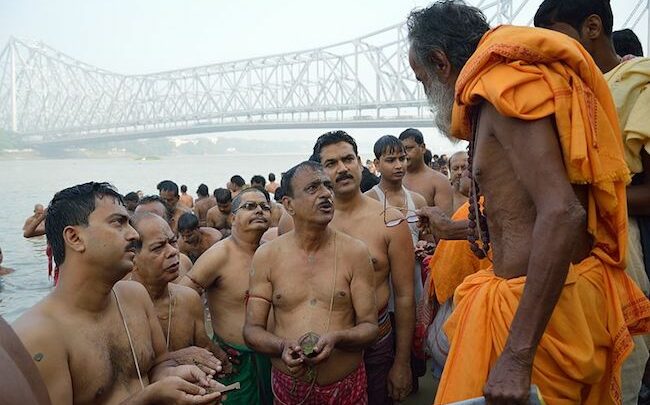Pitra-Paksha: Remembrance and observance for forefathers

By Sudhanshu Tripathi
The fortnight period just prior to auspices Sharadiya Navaratri every year happens to be equally pious as this period is called as Pitra Paksha or a period of two weeks meant for remembering our deceased parents and forefathers and also extending our due service as living mortals according to the perennial convention in this regard as obtained in the Hindu tradition.
It is firmly believed in this tradition that before attaining Moksha or salvation, these departed souls remain in Pitra Lok – though many such deceased directly achieve Moksha due to their karmic perfection in their innumerable prior yonis – which is temporary abode for them as Pitars, a kind of yoni – until their sons perform the Shraddha Karma, known as a bunch of rituals performed by the younger ones at Gaya in Bihar with a view to help them accomplish their final journey towards Moksha.
Indeed, Gaya occupies a distinct place in Hindu religion which is believed to be the most sacred place where the imprints of Lord Vishnu’s feet are inscribed on a rock where Shraddha Karma is performed. As the entire Shraddha Karma is spread over around a week or more with various kinds of rituals to be completed under supervision and guidance of Pandas – those Brahamins who are well-versed in these rituals and are designated to this job due to the outcome of their family traditions of several past generations. They are meant to ensure trouble free recess or passage into Moksha of all the Pitars of one’s family by solemnizing all rituals for this end at Gaya by the present one in lineage.
Those who have not yet completed their Shraddha Karma at Gaya are required to observe Tarpan each year during the Pitra Paksha with tendering pious water or Jal daana to satisfy (or tripti) them along with performing Shraddha on the date of death of the deceased one with offering as much offerings – as daana – as possible of dresses, house-hold utensils, food grains and other material objects including money etc.. These material offerings to the Brahamin are supposed to be received by the Pitars in their Pitar yonior any other yoniin which they are existing in the world.
This can be easily understood by several examples; like a dog being pampered by its masters in utter richness, eating best food, sleeping on bed or roaming in cars while being loved mostly in their laps, but the same fate is not enjoyed by all dogs in the world. Some live in affluence but many others suffer in extreme penury in the world. Why is this difference or discrimination? Of course, the law of the Karmaapplies on each and every soul of only human beings. And accordingly, he receives in the world what he has done in his previous several yonis which has determined his present yoni in this world.
It obviously proves that one suffers or enjoys only due to one’s own past deeds, whether good or bad, done in his or her innumerable yonis running into uncountable years, which fix his or her return upon earth as a living creature or final Moksha or union with the Almighty God in his abode as Supreme Brahanman. This is why one must extend the best service of his or her own parents all though their life in this temporal world as a pious and essential duty towards them and must recall Shravan Kumar as a role model to be honestly observed. It is very unfortunate that few people disobey and ignore or even hurt to kill them or put them in old age homes just for avoiding the essential duty of care with affection and respect when they become old and infirm.
Thus as obvious, it is in this connection that one must perform the due sacrifices and due rituals each day particularly during the Pitra Paksha just not for the sake of only remembering them (Pitars) by offering pious water or other material offerings but for the fact that the parents and forefathers happen to be the one’s first God in this mortal world. And their blessings while they were alive or even after their death is sine-qua-non for securing any divine blessing for any one ensuring his own sublimation or Moksha. We must always make our parents and forefathers happy and satisfied in each respect and must secure their favour in the form of their blessings during our entire life period. This is possible as nothing is beyond human endeavour.
Prof. Sudhanshu Tripathi, U.P. Rajarshi Tandon Open University, Prayagaraj (UP)






